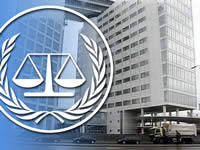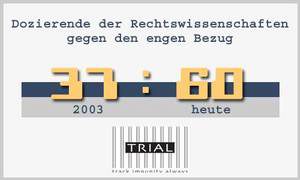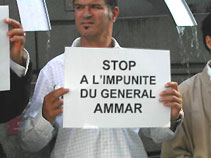12 mars 2003 :
Présentation du manuel juridique “La lutte contre l’impunité en droit suisse”
Conférence de presse pour présenter l’association et notre manuel juridique “La lutte contre l’impunité en droit suisse”, en présence de Bernard Bertossa, ancien Procureur général du canton de Genève.
Communiqué de presse:
La Suisse peut et doit faire plus dans la lutte contre l’impunité
Genève, 12 mars 2003
Les instruments juridiques pour réprimer le génocide, les crimes de guerre, les crimes contre l’humanité et la torture existent. Même s’ils ne sont pas parfaits, et si le droit suisse connaît certaines lacunes qui doivent être comblées, la législation fédérale permet de poursuivre les responsables des crimes les plus graves et de les punir, a affirmé aujourd’hui l’association TRIAL (Track Impunity Always).
Présentant son manuel juridique La lutte contre l’impunité en droit suisse, rédigé notamment en collaboration avec l’ancien Procureur général du canton de Genève, Monsieur Bernard Bertossa, TRIAL a appelé les autorités judiciaires fédérales et cantonales à s’engager avec détermination contre l’impunité, quand bien même les procédures peuvent s’avérer difficiles.
![[#Beginning of Shooting Data Section] Nikon CoolPix885 2003/03/12 08:52:50 JPEG (8-bit) Fine Image Size: 320 x 240 Color ConverterLens: None Focal Length: 8mm Exposure Mode: Programmed Auto Metering Mode: Multi-Pattern 1/60 sec - f/2.8 Exposure Comp.: 0 EV Sensitivity: Auto White Balance: Auto AF Mode: Manual 0.00 m Tone Comp: Auto Flash Sync Mode: Red Eye Reduction Electric Zoom Ratio: 1.00 Saturation comp: 0 Sharpening: Auto Noise Reduction: OFF [#End of Shooting Data Section]](https://trialinternational.org/wp-content/uploads/2016/06/RTEmagicC_SSCN1638.JPG.jpg)
“Alors que les juges à la Cour pénale internationale (CPI) viennent tout juste de prêter serment, il nous faut rappeler que la lutte contre l’impunité concerne en premier lieu les Etats, et non la CPI”, a déclaré Me Philip Grant, Président de TRIAL. (François Membrez, Philip Grant, Bernard Bertossa) “Celle-ci n’interviendra que lorsque les juridictions nationales ne voudront – ou ne pourront – poursuivre les crimes qui révoltent la conscience humaine. C’est donc aux Etats, et tout particulièrement à la Suisse, berceau du droit humanitaire, qu’il revient d’agir”.
TRIAL a rappelé que si la justice militaire suisse avait ouvert plusieurs procédures contre des criminels de guerre rwandais ou originaires de l’ex-Yougoslavie, et que l’une d’entre elle avait abouti à la condamnation d’un Rwandais à 14 ans de réclusion, d’autres affaires ont donné lieu à une inaction choquante. L’association a notamment rappelé que Félicien Kabuga, le financier du génocide rwandais, avait à l’époque été expulsé alors qu’il se trouvait en Suisse, au lieu d’être arrêté. Plus récemment, le demi-frère de Saddam Hussein, Barzan al-Tikriti, avait pu se rendre librement en Suisse pendant de longs mois, quand bien même une plainte pénale avait été déposée contre lui par ses victimes devant la justice helvétique. L’inaction des autorités de poursuite fédérales, puis l’adoption d’une décision lui interdisant tout retour en Suisse, ont permis à celui qui est soupçonné d’avoir fait disparaître des milliers de Kurdes lors d’une terrible opération de répression en 1983, de demeurer libre.
![[#Beginning of Shooting Data Section] Nikon CoolPix885 2003/03/12 08:53:42 JPEG (8-bit) Fine Image Size: 320 x 240 Color ConverterLens: None Focal Length: 8mm Exposure Mode: Programmed Auto Metering Mode: Multi-Pattern 1/60 sec - f/2.8 Exposure Comp.: 0 EV Sensitivity: Auto White Balance: Auto AF Mode: Manual 0.00 m Tone Comp: Auto Flash Sync Mode: Red Eye Reduction Electric Zoom Ratio: 1.00 Saturation comp: 0 Sharpening: Auto Noise Reduction: OFF [#End of Shooting Data Section]](https://trialinternational.org/wp-content/uploads/2016/06/RTEmagicC_SSCN1640.JPG.jpg)
“Un des reproches les plus fréquents adressés à la justice pénale réside dans l’incapacité de cette dernière à réprimer la délinquance des puissants ” a affirmé Bernard Bertossa. Pour l’ancien magistrat, ” moins encore que tout autre Etat, la Suisse ne peut s’épargner de participer à cet effort de justice, à ce mouvement qui s’amorce et qui doit tendre à ce que la crainte et l’insécurité quittent le camps des opprimés, des torturés, des déportés, des populations vouées à l’élimination, pour rejoindre celui de leurs bourreaux “.
Selon lui, les autorités de poursuite se doivent d’appliquer la loi et ne sauraient rester inactives lorsque des faits constitutifs de crimes de guerre, de génocide ou de torture sont portés à leur connaissance et que l’auteur peut être appréhendé. Et cela même si l’auteur du crime est étranger, a commis ses méfaits à l’étranger contre des victimes étrangères. La lutte contre l’impunité en droit suisse, édité grâce au soutien financier de plusieurs ONG, peut-être obtenu gratuitement par toute personne intéressée par la question de la mise en œuvre du droit pénal international en Suisse. Le manuel juridique, qui détaille les potentialités du droit suisse et dresse les obstacles qui demeurent dans la voie d’une répression efficace de certains crimes dits “internationaux”, peut être commandé sur le site internet de l’association : trialinternational.org.
“Sa large diffusion offrira aux autorités de poursuite, mais aussi aux avocats, aux ONG ou aux associations de victimes un instrument utile lorsqu’il s’agira de réagir en urgence, par exemple lorsqu’un bourreau notoire se trouvera pour une période limitée sur territoire suisse, et qu’il conviendra d’examiner si la justice de notre pays est compétente “, a indiqué Me Grant.
![[#Beginning of Shooting Data Section] Nikon CoolPix885 2003/03/12 08:26:46 JPEG (8-bit) Fine Image Size: 320 x 240 Color ConverterLens: None Focal Length: 8mm Exposure Mode: Programmed Auto Metering Mode: Multi-Pattern 1/30 sec - f/2.8 Exposure Comp.: 0 EV Sensitivity: Auto White Balance: Auto AF Mode: Manual 0.00 m Tone Comp: Auto Flash Sync Mode: Red Eye Reduction Electric Zoom Ratio: 1.00 Saturation comp: 0 Sharpening: Auto Noise Reduction: OFF [#End of Shooting Data Section]](https://trialinternational.org/wp-content/uploads/2016/06/RTEmagicC_SSCN1641.JPG.jpg)
L’association TRIAL, fondée en juin 2002 par des juristes, des militants des droits humains et des victimes de torture, a constitué un réseau d’avocats prêts à intervenir dans l’urgence pour les cas où ces situations se présenteront. Actuellement, plusieurs dossiers sont à l’étude et pourraient aboutir à des actions concrètes dans les mois à venir. Les responsables de l’association n’ont toutefois pu en dire plus, pour ne pas risquer de compromettre de telles actions.
![[#Beginning of Shooting Data Section] Nikon CoolPix885 2003/03/12 08:30:55 JPEG (8-bit) Fine Image Size: 320 x 240 Color ConverterLens: None Focal Length: 8mm Exposure Mode: Programmed Auto Metering Mode: Multi-Pattern 1/60 sec - f/2.8 Exposure Comp.: 0 EV Sensitivity: Auto White Balance: Auto AF Mode: Manual 0.00 m Tone Comp: Auto Flash Sync Mode: Red Eye Reduction Electric Zoom Ratio: 1.00 Saturation comp: 0 Sharpening: Auto Noise Reduction: OFF [#End of Shooting Data Section]](https://trialinternational.org/wp-content/uploads/2016/06/RTEmagicC_SSCN1647.JPG.jpg)
L’ouverture de procédures pénales ne constitue pas la seule finalité de TRIAL. L’association, par l’intermédiaire de son vice-président, Me François Membrez, va en effet prochainement introduire une demande en réparation devant la justice civile en faveur d’une victime de torture résidant en Suisse. Sévèrement torturée en Tunisie sous le règne de l’ancien ministre de l’Intérieur Abdallah Kallel – contre lequel une plainte pénale avait d’ailleurs été déposée en février 2001 alors qu’il se trouvait à l’hôpital cantonal de Genève –, la victime demandera réparation pour le dommage et le tort moral subis.
![[#Beginning of Shooting Data Section] Nikon CoolPix885 2003/03/12 08:29:18 JPEG (8-bit) Fine Image Size: 320 x 240 Color ConverterLens: None Focal Length: 18.4mm Exposure Mode: Programmed Auto Metering Mode: Multi-Pattern 1/60.1 sec - f/4.4 Exposure Comp.: 0 EV Sensitivity: Auto White Balance: Auto AF Mode: Manual 0.00 m Tone Comp: Auto Flash Sync Mode: Red Eye Reduction Electric Zoom Ratio: 1.00 Saturation comp: 0 Sharpening: Auto Noise Reduction: OFF [#End of Shooting Data Section]](https://trialinternational.org/wp-content/uploads/2016/06/RTEmagicC_SSCN1644.JPG.jpg)
“Dès lors que la justice tunisienne ne lui est d’aucun secours pour faire valoir son droit élémentaire à réparation, il ne reste à mon client qu’à saisir les tribunaux genevois ” a expliqué Me Membrez. Selon l’avocat, ” cette action semble être une première en Suisse. Si les tribunaux entrent en matière sur la demande, cela représentera un espoir pour de nombreuses victimes de torture domiciliées en Suisse d’obtenir de la justice qu’elle reconnaisse le crime commis et qu’elle condamne leurs bourreaux à devoir, au moins financièrement, payer pour leurs actes”. Dans le contexte international tendu, les responsables de TRIAL ont déclaré demeurer vigilants face au conflit qui se prépare en Irak. ” Si des crimes de guerre devaient être commis par quelque partie que ce soit, et leurs auteurs se trouver un jour dans notre pays, il y aurait lieu de s’interroger sérieusement sur la possibilité de saisir la justice “, ont indiqué les deux avocats. Mettant en garde contre la simplification du débat et le risque de confondre la responsabilité politique d’un dirigeant étranger avec sa responsabilité pénale individuelle – beaucoup plus difficile à établir devant un tribunal –, les responsables de TRIAL ont toutefois indiqué que ” les criminels, qu’ils soient dirigeants ou exécutants, ne sont aujourd’hui plus à l’abri de poursuites. La justice globale est en marche. Les récents développements du droit international nous encouragent à travailler en ce sens, au côté des victimes “.

 The
The 















 The complaint (f)
The complaint (f)![[#Beginning of Shooting Data Section] Nikon CoolPix885 2003/09/20 11:54:09 JPEG (8-bit) Fine Image Size: 320 x 240 Color ConverterLens: None Focal Length: 8mm Exposure Mode: Programmed Auto Metering Mode: Multi-Pattern 1/205.3 sec - f/2.8 Exposure Comp.: 0 EV Sensitivity: Auto White Balance: Auto AF Mode: Manual 0.00 m Tone Comp: Auto Flash Sync Mode: Front Curtain Electric Zoom Ratio: 1.00 Saturation comp: 0 Sharpening: Auto Noise Reduction: OFF [#End of Shooting Data Section]](https://trialinternational.org/wp-content/uploads/2016/06/RTEmagicC_SSCN2738_01.JPG-300x225.jpg)
 Impunity feeds off silence and the passivity of the judicial authorities. “It shall only recede if all democratic countries take it into their hands to charge, try and sentence torturers such as General Habib AMMAR”, added Mr. GRANT. A public protest against the authorities’ inaction was held Saturday morning in front of the hotel where – according to the latest information – General Habib AMMAR was still lodging, just a few steps away from the Palais Wilson, headquarters of the Office of the United Nations High Commissioner for Human Rights.
Impunity feeds off silence and the passivity of the judicial authorities. “It shall only recede if all democratic countries take it into their hands to charge, try and sentence torturers such as General Habib AMMAR”, added Mr. GRANT. A public protest against the authorities’ inaction was held Saturday morning in front of the hotel where – according to the latest information – General Habib AMMAR was still lodging, just a few steps away from the Palais Wilson, headquarters of the Office of the United Nations High Commissioner for Human Rights.![[#Beginning of Shooting Data Section] Nikon CoolPix885 2003/09/11 10:21:36 JPEG (8-bit) Fine Image Size: 1024 x 768 Color ConverterLens: None Focal Length: 24mm Exposure Mode: Programmed Auto Metering Mode: Multi-Pattern 1/60.1 sec - f/4.9 Exposure Comp.: 0 EV Sensitivity: Auto White Balance: Auto AF Mode: AF-C Tone Comp: Auto Flash Sync Mode: Front Curtain Electric Zoom Ratio: 1.00 Saturation comp: 0 Sharpening: Auto Noise Reduction: OFF [#End of Shooting Data Section]](https://trialinternational.org/wp-content/uploads/2016/06/RTEmagicC_plainteCIO_01.jpg.jpg)
![[#Beginning of Shooting Data Section] Nikon CoolPix885 2003/03/12 08:52:50 JPEG (8-bit) Fine Image Size: 320 x 240 Color ConverterLens: None Focal Length: 8mm Exposure Mode: Programmed Auto Metering Mode: Multi-Pattern 1/60 sec - f/2.8 Exposure Comp.: 0 EV Sensitivity: Auto White Balance: Auto AF Mode: Manual 0.00 m Tone Comp: Auto Flash Sync Mode: Red Eye Reduction Electric Zoom Ratio: 1.00 Saturation comp: 0 Sharpening: Auto Noise Reduction: OFF [#End of Shooting Data Section]](https://trialinternational.org/wp-content/uploads/2016/06/RTEmagicC_SSCN1638.JPG.jpg)
![[#Beginning of Shooting Data Section] Nikon CoolPix885 2003/03/12 08:53:42 JPEG (8-bit) Fine Image Size: 320 x 240 Color ConverterLens: None Focal Length: 8mm Exposure Mode: Programmed Auto Metering Mode: Multi-Pattern 1/60 sec - f/2.8 Exposure Comp.: 0 EV Sensitivity: Auto White Balance: Auto AF Mode: Manual 0.00 m Tone Comp: Auto Flash Sync Mode: Red Eye Reduction Electric Zoom Ratio: 1.00 Saturation comp: 0 Sharpening: Auto Noise Reduction: OFF [#End of Shooting Data Section]](https://trialinternational.org/wp-content/uploads/2016/06/RTEmagicC_SSCN1640.JPG.jpg)
![[#Beginning of Shooting Data Section] Nikon CoolPix885 2003/03/12 08:26:46 JPEG (8-bit) Fine Image Size: 320 x 240 Color ConverterLens: None Focal Length: 8mm Exposure Mode: Programmed Auto Metering Mode: Multi-Pattern 1/30 sec - f/2.8 Exposure Comp.: 0 EV Sensitivity: Auto White Balance: Auto AF Mode: Manual 0.00 m Tone Comp: Auto Flash Sync Mode: Red Eye Reduction Electric Zoom Ratio: 1.00 Saturation comp: 0 Sharpening: Auto Noise Reduction: OFF [#End of Shooting Data Section]](https://trialinternational.org/wp-content/uploads/2016/06/RTEmagicC_SSCN1641.JPG.jpg)
![[#Beginning of Shooting Data Section] Nikon CoolPix885 2003/03/12 08:30:55 JPEG (8-bit) Fine Image Size: 320 x 240 Color ConverterLens: None Focal Length: 8mm Exposure Mode: Programmed Auto Metering Mode: Multi-Pattern 1/60 sec - f/2.8 Exposure Comp.: 0 EV Sensitivity: Auto White Balance: Auto AF Mode: Manual 0.00 m Tone Comp: Auto Flash Sync Mode: Red Eye Reduction Electric Zoom Ratio: 1.00 Saturation comp: 0 Sharpening: Auto Noise Reduction: OFF [#End of Shooting Data Section]](https://trialinternational.org/wp-content/uploads/2016/06/RTEmagicC_SSCN1647.JPG.jpg)
![[#Beginning of Shooting Data Section] Nikon CoolPix885 2003/03/12 08:29:18 JPEG (8-bit) Fine Image Size: 320 x 240 Color ConverterLens: None Focal Length: 18.4mm Exposure Mode: Programmed Auto Metering Mode: Multi-Pattern 1/60.1 sec - f/4.4 Exposure Comp.: 0 EV Sensitivity: Auto White Balance: Auto AF Mode: Manual 0.00 m Tone Comp: Auto Flash Sync Mode: Red Eye Reduction Electric Zoom Ratio: 1.00 Saturation comp: 0 Sharpening: Auto Noise Reduction: OFF [#End of Shooting Data Section]](https://trialinternational.org/wp-content/uploads/2016/06/RTEmagicC_SSCN1644.JPG.jpg)